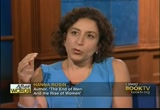tv Book TV After Words CSPAN October 28, 2012 11:00am-12:00pm EDT
11:00 am
11:01 am
>> host: give us the parameters for that. >> it starts with an economic argument, men have a harder time adapting to the economy and women are adapting more easily. there are periods when men have adapted easily but at this period, education and credentials. economy is fast-changing and who knows what it will throw at us? women are getting those killed and credentials that a faster rate than men are and seem to be more nimble and that filters into our society. in the book i talk about how that changes marriage and notions of fatherhood and what men can or cannot do in families or how young people have sex and make decisions and you start to
11:02 am
see it having an influence in our culture basically. >> host: we have heard there's a crisis with girls, they learn their not strong in math and science and bears emphasis on trying to prove that and it will come as a shock that women far outstripped men in academic performance. >> guest: i have a daughter and two sons. it you occasion is the clearest argument. girls do better than boys and now they have equal as 80 scores in math and do better in verbal scores. it starts early in life and that is largely a development question. we demand a lot more of younger and younger children and girls develop faster than boys. that is where it starts and people say boys get a sense of themselves as a little bit of failures in school. not because they're less smart. boys and girls are equally smart. it has to do with extra issues like discipline and can you sit
11:03 am
still and what schools are demanding of kids comes more naturally to girls than boys. i have an addendum to that i will get into in a minute and then you move to community college and other college and for every two degrees men get women get three degrees. that is a huge disparity. they reached parity about the 80s and since then women have been outstripping men. women should need a college degree, but the fact is they do need a college degree. it is a prerequisite. the economy is standing at the top of the mountain top, screening and a loudspeaker just getting college degree and you will make more money. very simple to get a degree. ..
11:04 am
they felt like immigrants, like my own parents are immigrants, that drive that they have to get ahead is part of this formula that seems to be moving women. maybe that worked from and after world war ii. never coming back from war. i'm doing my job back. different people are charging forward for different reasons. >> so what is the effect on the employment market? >> guest: in 2009 when became the majority of the american workforce, which is pretty remarkable. workingwoman was unusual enough in the 80's and 90's. they were like sitcoms. look how cool it is that women
11:05 am
are wearing pants suits. isn't that interesting. now women are the majority. it fluctuates. it became the majority and now it's kind of even. still, that is pretty remarkable you have over the course of 40 years men's wages kind of steadily stagnating in the declining, whereas women are steadily increasing. men on average still make more, but if you look at the charts, the trends are very much like this. and then couple that with the types of jobs that are opening up. so basically the way it works is women with college degrees into the workforce at greater numbers, and then they open up the kinds of jobs that women used to do for free, so that is like child care and food preparation, service economy, health care, and you have this booming health care industry. you see that it is this cascading effect where they're opens up more jobs for women and, you know, also, the end of
11:06 am
the manufacturing era is the most literal interpretation. in the book i visit towns that were largely dependent on manufacturing, and in which you could have a great life. this is not a new story. you could be a very prosperous middle class breadwinner, head of your household by working as a manager in a factory and making 70, 80,000, $100,000 a year. you have a very good life, and that option is really not available in the u.s. anymore, and i think that is really messed up a lot of men. that is really something that men have had a hard time recovering from in this generation. >> host: what you think that is? >> guest: you know, somebody said to me something so obvious that i have not thought of in this town in alabama that the right about. you have these women in get call themselves feminists and really have not been the question, so the don't like the situation where there suddenly -- they don't believe that they should be the head of there household, but they find themselves in this position and basically start at the bottom and work their way
11:07 am
up. but if you ask someone who had a life tended to henry was making a lot of money in doing pretty well, to start again at the bottom, that's harder. it's harder than for the women who -- for of even if they don't call themselves feminists and want to be in this position, it's kind of exciting. you're making a paycheck, letting his skills. that's easier than to ask of the guys to start from the bottom again or to sort of hostile or be aware that they weren't. so i got a sense over time that they had been protected in some funny way. i know we don't think of men in this way. we don't think of men as needing help. but they were protected in a sense, and so they did not really have to work that hard for it. women have this funny combination of opening job opportunities plus the sense that they are behind, like a sense that they need to hustle, and that seemed to create drive where men feel like they were suddenly went to the head. the life that was handed to them is now gone. adelle want to start the bottom, so you have growing numbers of
11:08 am
men and disability, which is what happens in some european countries where you have unemployment and disability and people give up after a certain amount of time. they just give up and see if their wives are earning money. the hard part of this. the book is not that trampled. good things for women and possible good things, but it is kind of are packing to watch and fall. >> host: some of it. >> guest: it is a disaster in some places, although, you know, you could imagine a world in which, like when i think of my own son for him some of this is true, they come from well-educated families, likely to go to college, but some of what is happening in schools is truth. it does not come as naturally to them as it does to my daughter to do the things that the school is asking. but, you know, would it be so bad if when they grew up it was possible for them to be dating or marry a woman who was making more money than they were and that wouldn't be such a big deal. that seems to be a good thing.
11:09 am
there are times in history women complained about the pressures of being a breadwinner. why is it always us? i feel like if we listen that up it would not be such a disaster. >> host: we have had the current system which you describe as disintegrating and that the most objective observers which had agreed. you have the data on your side for sure. but i wonder if that system a vault for reason. maybe it evolved out of the basic nature of man and in the basic nature of wedding, which are not the same speech to well, this has been the hardest question for me as this book rolls out, trying to think really hard, which i did not resolve of the book about where this ends. you talk tough, you know, an alabama when i talk to christian families it's easy for them. the man is ahead of a household, and they have had to rethink at a little bit, but the man remains the head of the household even if it is the spiritual head of the household. then there is the women and child care question which we have not gone to yet.
11:10 am
at what point do we reach the natural limits to mecca don't think we're there yet. i think there is greater room for men to be domestic without being utterly feminized and domesticated. more space for that, you know, you don't pass the gatt take care of his kids of the park. you should not be thinking what's wrong with that guy, which at some level of society we still do. i don't think there's anything inherent. >> host: on the weekends and after work spt tuesday afternoon at 3:00. >> host: a man who is a state of father who is -- >> guest: or you just passed that guy in the park. you think it will never get to that point. >> host: i'm not even attaching a value judgment to this. i merely noting as a resident in washington d.c. i don't know a single happy marriage in much the man is a state of that >> guest: because those men have not chosen to beat stay at home dads.
11:11 am
>> host: men's of a standing of them cells is bound of so entered in the what they do for a living. i think that grows out of there essential nature. i'm not endorsing that. i'm not aware, an unknown number of people who have been in that position, of a single happy stable marriage with a man stays at home. maybe there are. >> guest: that is interesting. let's explore that for a minute because it is an important question. i think increasingly women since these are tied to their work in a way which remain at like, which we may find, you know, disturbing and the natural, but it is, in fact, true. when i looked at someone like morris a mayor who has recently chosen to be the ceo, when she was visibly pregnant. and then was asked how much maternity leave you want to take and she said basically none. the fact that such women exist, it's not the way i would do that. i took plenty of maternity leave. but i feel like that is a
11:12 am
growing -- you know, that is a kind of woman that there can be spaceport. the fact that there are some stay-at-home dads who are happy and do not all entirely live in portland, ore., that is okay. >> host: whose wives respect them and are sexually attracted to them. i don't think that couple excess >> guest: they do. i did a survey. 8,000 people answered. explicitly a breadwinner wives. explicitly of women who make more money than their husbands. these were slate readers, which is the magazine that i am an editor at, so there is -- more educated than the general publication and the pro live in more literate, ordinary as. we're talking about is skewed sample, but the vast majority describe themselves as happy. >> host: that's great. i'm not against it. i'm just saying, it's not something i have seen, but there are many things i haven't seen. unwilling to believe that exists, but you will concede that two things.
11:13 am
one, that it is difficult for men get, this change of roles is very difficult for men. and for another that there is where a woman who would like a man who is more sensitive, more like kirk, classic feminine qualities, and then when he achieves those qualities she realizes it's kind of ripples of actually. >> guest: it's so funny. caitlin flanagan wrote a story which made this point, how sexy it is to watch them and make lunchboxes. >> host: for a dare to. yes. >> guest: on the other hand, of funny washington post's story which, you know, talked about all women want is where the men to reorganize things in the refrigerator and do the laundry and dry weight. i don't know where women fall on that question. somebody asked me this question. what are you exactly st. let's say your husband to his right now the editor of chief insulate and has worked hard his entire life becomes a stay-at- home dad. she said, how do you feel about that? are you attracted to him?
11:14 am
i'm asking you if you think politically. >> host: know. we're talking on a visceral level. what is your response to that. i really have thought hard about that. you know, i think, like, if he was happy in filled and was miserable, i feel the same way as i feel about the stay-at-home moms. they're always having to defend their situation and they're really unhappy and feel self-conscious. you know, i don't think -- that doesn't seem so natural to me. some who are just utterly fulfilled and probably more of them than there would be stay-at-home dads. i have a couple in my preschool. it was one of the moves that i had to make in this book is around this particular stay at home dads who was making hand print t-shirts. i was startled by that because, like he said, there is a visceral reaction we have to that, but i think it would be better if i beat the reaction of me. he plays music with his kids. >> host: someone is happy.
11:15 am
i just wonder how true it is. i have always noticed that no matter how evolved and aggressive a woman says she is that she as you where would you like to go to dinner tonight and you give an indecisive man beat him the answer she resents it. every woman i've ever met once you to say. >> guest: those of the women in your circles. >> host: are there women who like indecisive man? >> guest: it irritates me if anyone is indecisive, but there are some women who like to wear the pants. there can be a little more of a cultural space. i was on a series of radio shows. i'm psyched. but my wife wants to learn a lot of money. >> host: of course. laziness and self indulgence. of course to love it. >> guest: exactly, but you still don't feel like we have gone to the visceral attraction leveled. we can cover the cultural acceptance, the sort of economic flexibility, but then we will still be left. >> guest: we will bump up
11:16 am
against human nature at some point, and i don't doubt that there are all liars, for short. and i don't judge them. i do feel like as long as you're not hurting someone great. but i also wonder about systems that have been in place in roughly the same shape for millennia and you sort of rest yourself, why is that? and maybe because they're of coats of things that we can't change, that we are born with mistakes that we have that are innate. >> guest: i read all those books. female might in the male mind. it seems like a lot of attention to me. i don't see why we know. >> host: we keep inventing it in every culture through recorded history? >> guest: physical strength is a fact of mail existence and has been, the thing that grows out of physical strength. i find that women, the protector rule. the men and the providers. is just another mouth to feed. and now this is insulting, but i've heard that line. >> host: i believe it. there are a lot of men who the
11:17 am
women don't want to marry because they are not providers. protectors. hedgerow line there. they want, when i say, so what is the man good for, he will protect me. if there is emergency you will, and protect me. when it comes down not to the stay-at-home dad, but the physical protection, which is different than economic provider call its physical protection. i want a man to kind of be there in the case of an emergency, but that is not the same as if he works and is identified with his job that's physical. >> host: i wonder if it is purely physical. i mean, you -- i wonder -- you open the book with a really interesting revealing exchange with a woman that you mad down on the shore here of washington who is a shopping with a daughter. u.s. basically where is the man in your life and she says she's a loser, i don't want to memory. he takes up resources. and you sort of wonder, i understand, they guy sounds like a total loser, no reason to
11:18 am
marry him. she seems like she is in a tough spot. that does us in my progress. that seems like something pretty depressing. >> guest: i don't think that's progress. you want to end up in a situation where men and women need each other. i'm not sure if it needs to be in some evolution airily adaptive 40,000 year-old white, but it needs to be in some way. you don't end up in a situation where in more classes of society people are not getting married. i personally am not -- don't care if people get married, but it has to be in a european way where they live together, support each other or are in this house all but not necessarily married, not in the american way because americans are very into marriage, and so we get married. when we don't, it looks dysfunctional and means that you are not release supporting the family and not helping out. >> guest: what you think that is? >> guest: i think it is because of economic realities. i think that the men are not working in a think that the women -- it's like -- >> host: you think though he has set as a preference for
11:19 am
marriage? >> guest: i misunderstood the question. why do americans have a preference for marriage? we are conservative effectively and more religious than of the progressive cultures speak to. >> host: you don't think the reason is children? >> guest: no. i think europeans raise children together without getting married you're asking me specifically what we like marriage. we have high marriage rates and high divorce rates. we have -- we work out a lot of our family structures around marriage in a way that a lot of cultures when you say you live in progress of washington and people say anything goes, not really. we get married. we like marriage. the college-educated glasses are in an extremely conservative traditional moment. >> host: rich people get married and the poor people cannot. >> guest: it is a luxury of the rich. it is relatively recent. they used to be the opposite. >> host: there is overwhelming evidence that traditional american style marriage, no matter who is the breadwinner is
11:20 am
the optimum way, the optimum environment on average in which to raise children speech you in america. other countries have, but perfectly viable of the models, like swedish couples, european progress of couples don't really get married, but they stick together. >> host: they actually don't. unmarried couples sit together on average for a less long amount of time. >> guest: in america because we like marriage. we have what is called a marriage go around. it's not as simple as your saying. the most interesting but some marriages a culture that is obsessed with marriage is also always in the marriage. we have a very turnaround culture if you're not rich where stability of unions in america is related to the marriage, but in other countries it's not really. >> host: where does all this leave children? >> guest: you know, but not -- it depends which children. the children of the elites now, which is a see lots defined as college-educated, i think, in a pretty good time.
11:21 am
we are in a time in which children pay a lot. some might say an excessive amount of attention. we are in a hyper parenting moment where even the women are working these days they're spending more time with their children than they did 30 years ago. and i think fathers are more involved in that class of society. i'm sure you're not a father in the same way your father was. my husband is of the more involved than my own father was. the expectations of others are greater. i think this is a good moment if you are -- and your parents are much less likely to get divorced, much more likely to stay married and more likely to save their marriages happy. so if you are among the college-educated, you are in a good spot as a child, website. but if you or not, then you are in a much worse but then you were 20 years ago, particularly if you're a boy because your father is less likely to be around come was likely to be involved in your life. your parents, what is becoming entrenched, your parents are investing in a child is like a
11:22 am
real economic decision. and so parents or mothers make the decision that daughters are more successful in school and therefore are more likely to invested dollars in sin to college. what used to be true is now -- this is how you get entrenched make -- matriarchies. he will decide the daughters are going to be more successful. they put money in the daughters and mothers tend to be role models and the fathers are less and less around. so. >> host: the redefinition of gender roles has weakened the traditional family. think you would agree. >> guest: in certain segments. in the college educated spit strengthened marriage and made it possible for people to not be stuck in certain roles. i think people guessed the reason that marriages are happier now is because of in the book what i call see some marriages. at least theoretically nobody is stuck in a certain role. so the women feel like she can be making more money. the obama's have a seesaw
11:23 am
marriage, as to the biden's. michele obama is working as an executive and barack is in law school. now she's the first lady and he's the president. theoretically people conflict. the clintons, i suppose to some extent. it's not uncommon to have a marriage for couples kind of take turns. i think that takes the pressure off of a marriage, like the marriage that one read about in 1962 with a woman fell and fell and the man felt like there was a news around his neck because there is so much pressure on him. that model of marriage has loosened up a little bit and created fairly happy comestible marriages for the college-educated. >> guest: >> host: i wonder about kids. clearly more kids in day care, small children in day care now there were 40 years ago. how can that be a good thing? >> guest: lots of countries. scandinavian countries, children go to day care when their one and mother stay home. of that is necessarily a bad thing. surveys are pretty politically neutral. the only measure americans, how
11:24 am
much time you spend in leisure activities, how much time you spend with your kids. parents spend more time with their children now than they did in the 60's and 70's. don't ask me how. >> host: but there are still, i'm pretty sure the data supports this point. more 1-year-old kids in day care today than there were 50 years ago. and i'm wondering how one could argue that that is a good thing. >> guest: i don't know. i don't know what the data shows about what is wrong with children. and don't necessarily think there's anything wrong with children being in day care or having babysitters. that seems unnecessarily ago or bad thing. if you have to involve parents and your child is in day care from 95, it seems like a natural thing to me. if you have a decent -- i mean, it depends on the day care. if you have -- my children go to preschool. it's a lovely preschool with a lot of teachers, their there
11:25 am
until noon or two and then -- it's like these things are not necessarily better necessarily good. >> host: i guess just having four children it is hard to imagine that your nine month old infant is going to be cared for as well by strangers esses by his mom. >> guest: i don't think that the problem for at least college-educated parents these days is that when neglected children. we, in fact, have a kind of intense parenting culture right now. we can debate whether we make our children do too many activities or whether we -- but i think largely will we see his parents invest a huge amount of their children these days. this is not an era of neglect. you see them madmen era where women spend a lot of time with children and generally neglected children as their supposedly spending a lot of time with them. >> host: overcompensating. >> guest: the fact is, parents spend a huge amount.
11:26 am
what do i know what women did with their children than over the weekend. all we do is manage our children's lives and make sure there okay and lori about their happiness. we spend a lot of time. >> host: where is that? >> guest: that comes from, i don't know. some large pressure. i think it comes from a sense of kind of like kilts and changing roles and the fact that we were real lot. the more women work the more people worry aloud about the kinds of things you were expressing. sunlight people accept this please, so they come home and worry about their children. the fact is, we invest a lot and spend a lot. life is complicated and busy in children are over scheduled and all that. if anything would say the children could use more. this is like the character building argument. the book -- >> host: i cannot agree more. >> guest: more time for children to worry about themselves and take care of themselves rather than their parents managing, but that is --
11:27 am
you know, when i do talk about, what happens a lot with working women and even breadwinner women is that women don't tend to give up rounds when they take on new. a lot of the couples in my book, women are doing a lot of work, but they are also really managing the domestic the closely. and so even these women whose husbands are home during the day kind of a takeover when they get home. this is something that women tend to do. sp1 we being the man without his own sphere. >> guest: it creates a lot of pressure on the woman and creates a lot of confusion. one of the men that i interview calls his wife a kind of over involved absentee bosses. it's like he never really feels like he can, you know, completely on the rome. the women are tinkering in all spaces. >> host: giving back to my point about emasculation, i think. seriously. especially men, every person needs to do something they feel the master of. i am very get this.
11:28 am
no one is as good at this as i am. >> guest: i would say that about most women. >> host: at think that's absolutely right. >> guest: i can name a handful of stay at home moms who do not have some kind of anxiety about that. and that this society today. there are some who do. utterly felt the man that think this is because we are a skewed sample because we live in washington. some who set up to do this. it's what they're doing for a certain number of years and their fantastic entirely filled, but a large majority think i did it feel judged or just by me because i work or what do i know. but if we just go by the sample that we know it's, you know, you at least after shade and a little bit by saying it's not an entirely settle the rate for women. >> host: i completely agree. i just think that men are more fragile and women in this regard >> guest: and the regard of the near suffolk to the to come from the public's fear of. >> host: from what they do for a living. >> guest: when i interview younger couples what i found as
11:29 am
they operate on a much cleaner slate and maybe you and i do. they actually genuinely have removed the sense of gender from a lot of these roles. there will say things which is not the way in college, maybe i was in a quality feminist movement. and so we generally have the idea that this is going to work and we will will help raise the children and it will be equal, 50-50. i find that the people in their 20's and 30's july interview who are kind of rising in some profession that i write about in the book, they will say, well, whoever fills -- whoever will be the breadwinner at that moment. when asked on what the future plans they say, oh, yes. whoever is the breadwinner. they talk about it like a roll. sort of the theater role. one or another person can dress up or jump into. it's much cleaner than when i was in college. >> host: that is not mike, -- experience at all. i grew up in a liberal place and did not have deep assumptions about generals of.
11:30 am
i did not think that my wife would stay home. i was totally open minded about it. i have come to my views pretty honestly actually which is to say not through reading about them or some sort of theoretical process of reaching a conclusion but by kind of seeing what works and seems to make people happy. >> guest: you could go far along this continual, and if i take my own life which i write about a little bit in the book, i do some of the things of the people that i write about. there was one time when my husband was taking the kids and the vacation because i had to finish a chapter of the book. as i watched him get them together and he was going off with his brother or sister law, in my head was running through all the things that he was to wrong. he was unpacking this are doing that were doing exactly the way that i did it, but, you know, i don't know that that is a natural instinct. maybe that is a nagging. i kept my mouth shut and did not say anything because i writing this book and understand that is what i should do, and it was fine. it did not matter that the
11:31 am
children did not have the book that bin. did not matter. some may be what people do is invent new ways of doing things, and that is okay. >> host: i doubt their is a mother in the world would not have those thoughts. >> guest: exactly. >> host: so maybe they are growing out of something that can't be changed. >> guest: why not? >> host: human nature is immutable. >> guest: there are so many things that we thought of as human nature. women should not work. we have described as human nature so many things that women have kind of trample on over the course of the century, not so much woodman i would say, which is one of the phenomenon i described. we thought women to working and all with young children was a natural and that women working well mary was overly unnatural, and so we have laws that said that should not happen. you know, that women making more money and a man was a natural because, of course the men had to be the breadwinner. we have that many things are a natural. i hear you, there may be a point where something really is a natural, but i don't think we know that, and i don't think we
11:32 am
have reached that point. i think we have lied to ourselves about that a lot of this century's. >> host: i think we have lie to ourselves and the other direction. i was pretty open-minded about the nature versus nurture debate until i had kids and realize that parenting had much less effect that the audit was supposed to because kids are actually sort of board the way that they are the. >> guest: i agree with that. a lot of that is also determined as the one there are many factors. sex is one among several. but it is a factor. what are the innate differences? >> guest: i don't know. honestly, i have read these books. part of my research for this book was to sit down with the male brain in the female brain. you know, the ads. the convincing argument seems to be that we have a huge amount more in common than we have -- that is different, and that whatever is different between men and women is not so
11:33 am
ingrained as to totally determined complicated decisions like you going to go to college, who are you going to marry? these are very complex decisions if you look at other countries. people think the men are systematizes and women are empathizes. that is one shorthand for the difference between men and women. i will tell you, i have two sons, one of them is exclusively obsessed with trucks and cars and the other one is like the budding computer programmer. my daughter spends a lot of time reading. have i succeeded in scrambling gender roles? no, i have not. but, does that mean, you know, you're talking about a snapshot of childhood. does that mean anything in the future about the decisions that they make into the marriage? it probably means something, but it does not determine these vast social changes that we see in our world. it does not mean that my daughter is going to stay home and take care for children. it means something, but it does not mean a huge amount. acting that is where i come down on it.
11:34 am
>> host: this seems like history is littered with experiments in which the designers proclaim an end to the old way of doing things in the beginning of the new way. and in the end and the french revolution and also more benign movements like feminism kind in the end people sort of revert to the way that there really are. >> guest: i would say -- iso disagree. in the end people move at a vast, vast way along the continuum. men and women over 100 years have changed. women especially, vastly. and you might be right that we will reach a roadblock, but i don't know where it is. this idea that women cannot to math and science, well, you go to eastern europe or asia or one of my chapters is. women do math and science and engineering fine. the idea that women empathizing brains cannot handle, you know
11:35 am
-- we don't know. let's try an experiment. try the experiment where you remove any social, you know, any social expectations which are hugely influential on how people see themselves and how they behave and then we will see. maybe in 100 years we will get to the point where we are like, you know what, we have reached the end. i cannot be attracted to this kind of man and i cannot become this kind of woman, but we are not close to that. >> host: how are we doing developing team of phosphorus? >> guest: what do you mean? there are plenty of them of philosophers. at that you're going to -- but that it was going to be like -- you could give me would like, you know, you could give you a silicon valley genius. there are professions where, you know, it's true that american women at least don't flock. >> host: given that women are doing so well, and as you have seven proven, at least to my satisfaction, beating and in virtually every important category, why do we have a part
11:36 am
of action for women? >> guest: that you're going to as aren't 35 words are female president. >> the trends are real and they seem to be. of course that will happen. so while we have this massive apparatus in place in the federal and state government level that treats women as underperforming victims of the patriarch? gives them preference in hiring and federal contracting. >> guest: let's go case by case. i will take the university's first. their i think, you know, there is quietly affirmative action for man commander just don't talk about it or admit it. you have to go case by case. in the workplace, there are lots of ways, and really because i describe the phenomenon and
11:37 am
describe that women are rising in the work force does not -- there is a parallel thing of how women get paid and negotiate and where they start on a ladder and how they're treated in the work force and whether or not we have maternity leave. those questions are totally not settled. women are rising and setting down roots and getting the structure and education that they need, but the work force does not necessarily welcome the man. there is a lot of, you know, equality in the workforce. >> host: let me give you a really simple. the small business administration gives loans to small businesses. under the obama administration, which has existed three and a half years, exactly the time at which this has become really obvious that women are winning, that administration has expanded the categories of businesses that receive preferential loans, tax dollars if they are owned by women. now, since women are winning, why the hell are we doing that?
11:38 am
>> guest: small businesses i think differently than i think of workplaces. places that are totally like finance and law firms, those places i feel like to not acknowledge the rise of women or taken into account or accepted. why are you giving me that look. small business, it's a different question. i wish i knew more about small businesses. sao. >> host: but the principle remains. women of succeeding commoner failing in the federal government gives preference to women. >> guest: women are starting in places where i described, women still get underpaid. there just, you know, creeping their way up. you can be ahead and still be treated unfairly. i don't really think those things are necessarily have anything to do with each other. how is it that we have a work force where women are the majority and we don't have any paid maternity leave. that just does not make any sense to me. it's like we have solved all of the issues merely because women
11:39 am
on their own one at a time are acting like emigrants and like -- we don't have any. >> host: required by law. >> guest: but there is no other country were that's true. >> host: the first amendment or bill of rights. lots of things america does unique or better. as of much of an argument, but you have not done -- you have that answer my question. if you established conclusively the trend line, why would we be giving trip preference to the group that is succeeding? why we giving preference to the group that is failing. >> because every woman is succeeding on her own, despite the fact that the work force does not give any allowance to, like, you know, children or the other things that women have to do or humane life in america. i feel like just because women if individually are succeeding. women are basically emigrants. each one charging floridian doing their individual thing. i would say despite the fact that they have more.
11:40 am
>> host: you are arguing a minute ago that it was because of that. comparing their experience to that of immigrants and implying that it was a head wind that they faced that makes them more tenacious. >> guest: i think those things are tied in together. i do not think it is -- we should end. i think it is because in some sense women have to have a lot to prove and more things that they have to get over, and still, look, we are uncomfortable with female power. a female president tomorrow. in every psychological study you have a woman who is to afford the reading the same script as a man and says i would like to raise because i think that is never raised. she gets penalized. we obviously have not worked out all of these questions that. >> host: from going to give up in the second. tell me the point at which we can say women have succeeded and we can take your thumb off of the scale and create an equal playing field? at the federal level where government intercedes with the
11:41 am
private sector. >> guest: where should our artificial -- >> host: when should affirmative-action stop? >> guest: when you can come as a class, measure women, not as an individual person, as a class measurement and see that they work roughly equivalent numbers of hours and get paid roughly equivalent amount for roughly equivalent jobs. >> host: at what point will they be working roughly equivalent hours? to have to have massive changes in behavior for that to happen because were not even close. >> guest: so we take up the hours. the problem with the wage gap measure is most people say it now. women get $0.77 on the dollar that men get. it's not actually true because women were fewer hours. that's actually not that great measure quality. women worked your hours, so your taking women on aggregate. as take that off the table. we will take the hours. roughly equivalent jobs get paid roughly equivalent amounts, where they're is a small gap now, but not a huge gap. right now there is still a gap even if you take the same number of hours, the same job between
11:42 am
men women. there is some small gap which has to be a lag in discrimination or the fact that women don't feel comfortable asking for raises. there is still some cultural factor. >> host: so because women don't feel comfortable asking for raises i merely quoting you. because they don't fill comfortable asking for raises that the rogue government should penalize male small businesses, is that what you're saying? >> guest: you think there is no discrimination. >> host: is not the argument of making. and making the argument that the federal government should not be discriminating against men in its allocation of loans or federal highway contracts or any of the other goodies that the federal government divvies up. men are in serious trouble. announcing affirmative action should benefit men. i hate affirmative-action in all this forms. >> guest: you're taking something -- year to commit to any government program. pakistan assenting to use. >> host: and massive government programs. >> guest: more massive government programs which into
11:43 am
favor men. second you have to take an industry by industry. a way that they did with cause emissions when it came up with very intelligent affirmative action programs that were genuinely doing. you just a believe in any kind of affirmative action. >> host: i believe in fairness. affirmative action programs are not tiny. i mentioned one that is relatively, the federal budget, small business administration, but it is -- it purveys government. and it just, it feels wrong at that time, just going by the conclusions of your book, to restate my by completely that men are in deep trouble. as a matter of policy, is committed against by the government into which they pay. >> guest: you have a sun. you have a daughter. let's say your son. >> host: i have three daughters. >> guest: let's say your son received affirmative action in college because men were not getting in. about to be a class that was very unequal.
11:44 am
this was a private college. your son received a leg up basically because he was a boy. would you be all right. >> guest: i don't believe an adult. i agree with you. as the father of three girls i am aware of this and that think you're right, there is affirmative action and colleges that helps boys. i think their is a moral difference between affirmative action practices by private sector institution and that practice by the government. this government lost almost all citizens and taxpayers commensal by definition it should not be discriminated against as a. >> guest: which should help people that need help. the government and private institution. more their responsibility to watch out for people who might feel like that as long as you do it intelligently. >> host: given that, why shouldn't we institutes today on the basis of your findings radical affirmative action programs for men? >> guest: with that look like america? the weather by protectionism. >> host: it would look like the reverse of what we have now, giving a preference in hiring,
11:45 am
preference in federal contracts. so many of them are out of work. a military. >> guest: it depends where in what industry. you cannot sledgehammer affirmative-action. it does not help anyone. you can see -- >> host: reversal we have right now. the male owned business gets preference. why not? men are in trouble? >> guest: maybe not in individually owned businesses. i don't really know. >> host: they're either in trouble and they're not. >> guest: no. men are in trouble -- this is uneven. is not like all of a sudden all women are doing better than all men. if you look at the leaders of your average law firm you would find a different picture than if you looked at them and -- manufacturing sector. so in the book you take different sectors that have different analyses. so when i look at silicon valley, which i do an interview a lot of women there, that is a very different picture than welcome manufacturing town in alabama and into the couple's there. they're going to different things. a part of me that left the town in which there would just get
11:46 am
factory back. the government had created artificial protectionism. i understand, not so and if @booktv sophisticated and know what global forces are. but there definitely was a part of me that wished that we had not sent those factors out said that we could have, you know, you know, my sweatshirt the $3 cheaper at the walmart. i did not think that was a good trade-off, but we traded a lot of men and identity and pride for much cheaper structured, and that seemed like a bad trade me. so, know, that would be help that i would accept, and that would essentially be functional affirmative action for men. >> host: so rather than giving preference to the no businesses, giving preferences to businesses owned by men with high school degrees. >> guest: in manufacturing. maybe as many don't start. >> host: nursing. nursing is completely dominated by women, and so is education. in a lot of rural communities, as you know, health care and education to schools and hospitals provide the only stable jobs. >> guest: so i will --
11:47 am
>> host: in those jobs are a woman with dominated by women. the result is female headed households in all the pathologies that flow from that. why would it not make sense to make certain that half of all elementary school teachers are made? >> guest: that would be great. i think that would be great. at that would not only be good for men. i think it would also change the cultural factors around these jobs. i think right now men that i interviewed in my book find those jobs to be done much so even though, you know, not all that long ago secretary was explicitly a job reserved for a man because it meant you held the trusted secrets of the firm. eventually the secretary begin a female job and then flee. you know, as i described the book, women don't do that. they're fine with going into male-dominated professions. men are not. i would be perfectly happy with them and putting in my catheter that hospital, and i would be perfectly happy if men became nurses and did not find that and much of because that would
11:48 am
especially in the small manufacturing towns, what to these towns have? they have hospitals and schools. so that is like -- that, to me, is the easy one. if we give men free tuition to gut the community college, become a nurse and then a job at the local hospital, that will be a government program would get beyond. >> i think that would be a grotesque and belittling think. i admire your willingness to follow these ideas through to the logical conclusion. we're probably not going to do that because men probably would not accepted. one hopes it would have enough self-respect and dignity. there is really no debate about that because that is the way men's minds work. why is it that the grandson's of rich people are not always, but generally an impressive? this is not a phenomenon you have noticed? >> what to we have to respect for mitt romney? all those handsome sons are not
11:49 am
going to produce any could spawn? >> they might. they absolutely might, but the trend line is negative, as you know. >> because it is a sense of entitlement. how we serve this devastation. people ask me, and nearly inflexible. well, no. you know lots of men who are flexible. they have been flexible. why are all the men in your book such cut potatoes? you look at this moment in history, and they're is a little bit of region this. menem would need things, that would be fine. at the debt would be better to me admit that anything. terms of the generation spot average people, because when much is handed to you it is difficult to be flexible. >> host: exactly. that is exactly. so what do you do? because, by the way, when in collapse it hurts women and it really hurts children for sure. so this is not a small thing in another you are not gloating over the end of man. i don't think that you are.
11:50 am
it's that good. what do you do? >> you hope that men adapt some flexibility and do certain kinds of jobs that they have formally not found to be macho enough. >> host: sucking up and become nurses. >> no. some of them, yes. some of them, that is what happens to a man in my book and people read the story in think, we all have to become nurses. now, some percentage of men became teachers and nurses and especially teachers because i think that would do a whole lot to solve the bigger problem of boys in schools, that i would find absolutely fabulous. >> host: what with the non was amended? and totally kidding. of sort of getting. >> guest: come on. oh, my god. you're terrible. it would be fabulous of mormon which teachers. but that aside, people starting to come up with creative solutions that meet this problem of late. but a much talk about? dignified exit from an that
11:51 am
don't require an to become women but for some of the men in my book, for example, high-tech manufacturing, something that requires you to get some amount of education in the current degree but not spend your life in school because even factories now are much more complicated than they used to be. you can still consider yourself macho, but, you know, meet this economy halfway. it digress and education you need for an expanded manufacturing existence. that is not the old kind. one hopeful exit path. something that people call artists in manufacturing where another guy in my book who is in his fifties when he left his textile job now makes specialized structures for the people in the area. this is something people do in brooklyn and alabama. in fact, it is so funny you should say that because i got the most tender, moving you know from a guy who is in glass blowing any said to me, i cannot find good mentor for me. i feel like i would pay them to get the education. this is a good paying job.
11:52 am
i have a factory in get hired 30 people. i cannot find any man who has the work of the to do this job. i have not fact checked. >> host: you don't want to inhale. it's really impressive. why is it, and this has to play some role in the phenomenon you describe, it -- this plane traditionally masculine traits is mocked kind of castrating attitude. >> i think that have contributed to that by the title of my book alone. i really have. it's funny. you put together a book and the chapter by chapter. you don't realize that the aggregate portrait that i have repeated at certain stereotypes in chapter after chapter and by the end you think what is wrong with being a man? to we all have to become women? of course we don't. we are in a moment where -- and i find this more with progressive guys because i think guys in manufacturing towns
11:53 am
don't actually have this problem. maybe they sense it or listen to rush limbaugh and have the sense that it is, but deep in their hearts they don't actually feel that, but for progressive guys i feel that they actually are stuck in a funny moments where all the television they have wants to stop them the big white boss is ironic. it's not like you are actually allowed to be the boss on 30 rock or in the office. that guy is a joke, but you don't want to be the stay at home. i have a guy in my book like "like this too is a progressive guy and works in a creative economy. i just don't know which way to go because obviously it's a socially acceptable, but i see the stay-at-home dad in the park in the shutter and i cannot be that guy even though i believe in them. i believe in him. i wanted to exist and politically and in to him, but i'd want to be that guy. >> host: your wife will have contempt. in the end, she will.
11:54 am
it does not mean you have to chew tobacco and brick courses are something, but it does mean if you are in a decisive and a week the woman you live with will have contempt for you . >> guest: i can't believe you equate that. i am waiting. >> host: wait a minute. i'm not equating being a father with the indecisive and weak. i'm just saying overly feminized men saw the two why is taking care of your children of feminized this p1 and not talking about child raising. i sang in general the takes of the progressive guy, you know what i mean, the sensitive guy with the general, rachael part as an all that stuff coming in the end. >> guest: does he really do it for you? >> host: he's considered feminine without being feminized. america is getting so progressive and women are all about the plastic generals. fifty shades of gray, which is really a feminist utopia.
11:55 am
it really in the end she just wants to dismantle what to do. >> guest: i feel the same way about the contraception debate. >> host: a best seller among women i college campuses. why? >> guest: a lot of this town's >> host: come on. estelle's ever things they have never experienced. >> guest: for a world that is leaving us. there is a lot -- i find this among men and women. a way in which we are giving up one world entering another world. readjust grappling with that. >> host: clearly it is resonating on a deeper level. >> guest: we have movies where women are killers. the most popular heroine of the day. she is the protector, the provider, the killer. and they guy is the feminized one who is waiting in the distance up to win over a crowd. we are working out pretty
11:56 am
extreme stereotypes year. like the book is like as extreme as, you know, as having a woman killer who kills other -- you know what i mean? were working out these extremes. >> host: the difference is the male audience for 50 shades of gray is like zero. if i found it totally on erotic because it was not aimed at america's ability at all. completely in the women. there ready because i love women and no one to understand them better. after it covers and a wife. and the other novel, of course, was aimed at both sexes and that the men liked it. i still think it is worth thinking through white progressive enlightened women with really very few preconceptions about gender roles love a book about an overbearing dude who likes to spit curls. >> but that do it was
11:57 am
ridiculous. >> that guy does not exist. if one preserves that guy in a fantasy, that's fine. that does not mean that the world is like that or will ever be like that. >> host: how did that even appeal to a woman with the president's ability? the lot going on beneath the surface. >> guest: that fantasy has persisted all through the era of feminism, domination. that is like a steady fantasy. because i have a chapter about the heart of culture and sex, i spend a lot of time talking to sex researchers. one thing that one comes upon is that is a persistent fantasy that has not waned all through the areas of feminism which tells you that it is not as simple as we pretend it is. in the end there are desires. if sex is a window into how we
11:58 am
really feel. >> guest: we did feel that way forever about sex and the world can change over our heads drastically and we could continue to feel that way about sex. that seems a possibility to me. it is a window into something. that's true. >> host: i think it's a little deeper than that, but i see what you're saying. we are of many minds on this question. >> guest: had a we get to this point in the conversation? >> set up the book was really interesting. i disagree with some of your conclusions, but i really enjoy it. unfortunately i think you're right about a lot of it. thanks you very much. >> that was after words, signature program in which authors are interviewed by journalists, public policy makers, legislators, and others
11:59 am
familiar with the material. airing every weekend at 10:00 p.m. on saturday, 12 and 9:00 p.m. on sunday, and 12:00 a.m. on monday. you can also watch online. cut test book tv and click on afterwards. >> and no more live coverage of the 17th annual texas book festival in austin. here is our lineup for today. ..
154 Views
IN COLLECTIONS
CSPAN2 Television Archive
Television Archive  Television Archive News Search Service
Television Archive News Search Service 
Uploaded by TV Archive on

 Live Music Archive
Live Music Archive Librivox Free Audio
Librivox Free Audio Metropolitan Museum
Metropolitan Museum Cleveland Museum of Art
Cleveland Museum of Art Internet Arcade
Internet Arcade Console Living Room
Console Living Room Books to Borrow
Books to Borrow Open Library
Open Library TV News
TV News Understanding 9/11
Understanding 9/11


























































